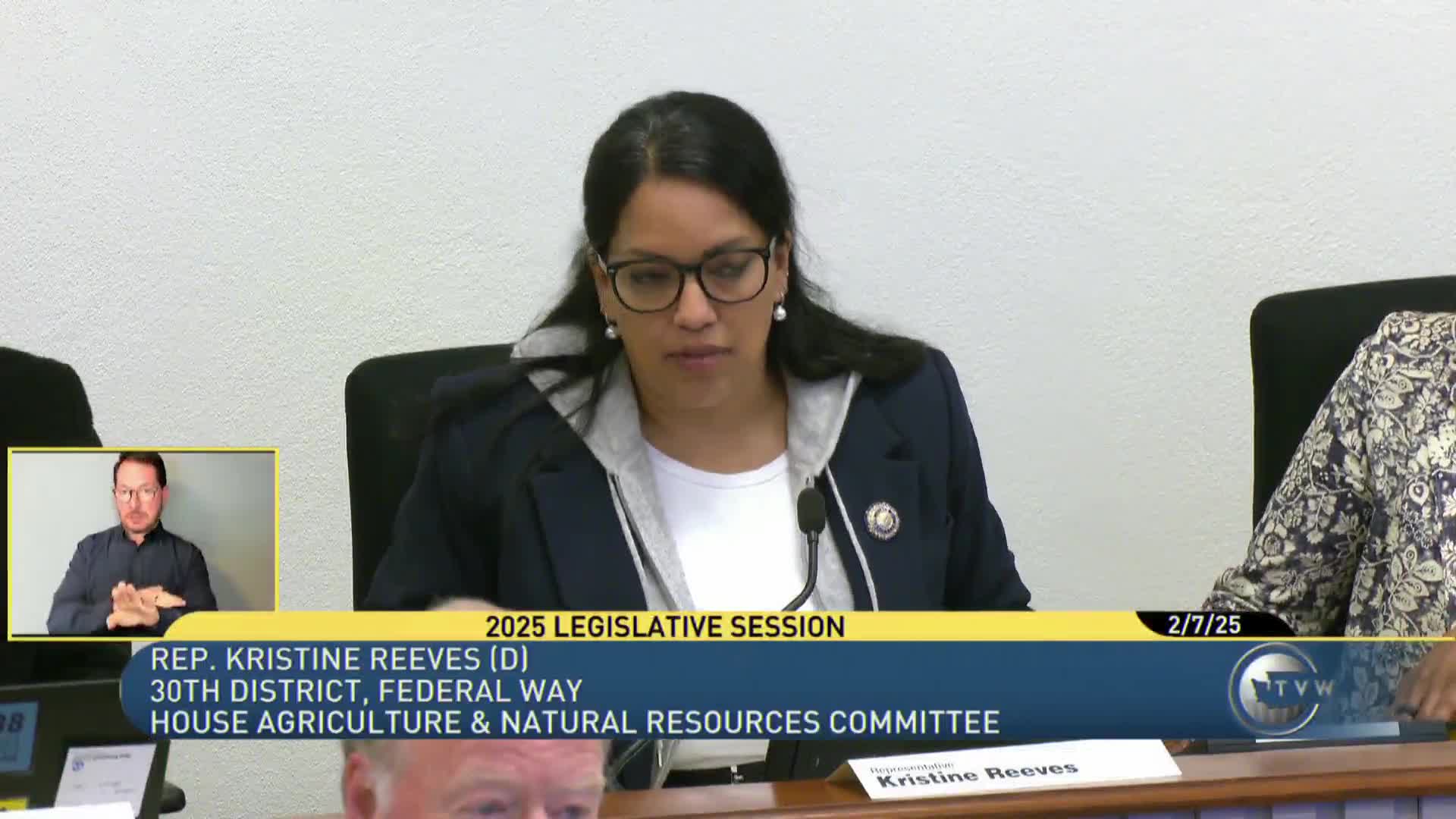Committee Hears Testimony on Bill to Ban Force‑Feeding of Birds (HB 1735)
Get AI-powered insights, summaries, and transcripts
Subscribe
Summary
The House Agriculture and Natural Resources Committee opened a public hearing Friday on House Bill 1735, which would prohibit force‑feeding birds to enlarge their livers and would make it unlawful to sell, possess, transport or distribute foie gras produced using force‑feeding in Washington.
The House Agriculture and Natural Resources Committee opened a public hearing Friday on House Bill 1735, which would prohibit force‑feeding birds to enlarge their livers and would make it unlawful to sell, possess, transport or distribute foie gras produced using force feeding in Washington.
The bill’s staff briefing, delivered by Rebecca Lewis, summarized the measure: HB 1735 would bar force feeding of a bird “for the purpose of enlarging the liver beyond its normal size,” except when a veterinarian directs feeding to improve a bird’s health, and would subject violations to civil penalties of up to $1,000 per violation and up to $1,000 per day for continuing violations. The bill’s prohibitions would take effect Jan. 1, 2028, Lewis said.
Supporters said the practice—commonly called gavage—causes severe animal suffering and presents public‑health and environmental risks. Lisa Parshay, the bill’s prime sponsor and a veterinarian, told the committee she had seen the practice as a veterinary student and said “I don't know of a veterinarian that supports this practice.” Parshay described force feeding as “an extremely uncomfortable and hazardous process,” said many birds die before harvest and asserted the method concentrates pathogens in the birds’ livers. She added that an Environmental Protection Agency evaluation found Clean Water Act infractions at a large U.S. foie gras farm and urged the committee to prohibit both the practice and sale of products made using it.
Members of the public and organizational representatives testified on both sides. Proponents included: - Wendy Linton, a King County resident, who told the committee foie gras production harms ecosystems and public health and urged a yes vote; she noted plant‑based alternatives exist. - Amanda Fox, executive director of the Bridal Rights Initiative, said “foie gras farms” pose a public‑health risk because of concentrated pathogens and linked the practice to avian influenza outbreaks in major producing countries; she said fewer than 1% of Washington restaurants serve foie gras and that the state has no known foie gras farms. - Jennifer Mattson of Rooster House Rescue described conditions she said are typical in foie gras production and supported the ban. - Colburn Clark, a former farmer from Pullman, and Kirsten Gregory of Posato Safe Haven also urged passage.
The Washington Hospitality Association registered opposition through Julia Gorton, who said the industry’s leading supplier operates a 200‑acre cage‑free farm outside Washington and that the association had concerns about the bill’s scope. Gorton said HB 1735’s definition of force feeding includes hand feeding and that the association would support a separate bill focused on animal welfare standards rather than a ban that covers feeding method.
Committee members asked questions about the prevalence of the practice in Washington; Parshay and witnesses said they believed there were few or no current Washington producers and that most sales would be through restaurants. The committee’s record also includes 342 pro and 61 con sign‑ins, which staff read into the hearing record.
No committee vote occurred during the hearing. The bill record before the committee includes the staff summary, testimony from the prime sponsor and multiple organizations and residents, and the written sign‑in totals. Committee members did not adopt policy language or take final action at the hearing; the bill will proceed through the committee process if committee leaders schedule a work session or executive action at a later date.
Ending: The committee concluded the public hearing and moved on to other agenda items. The bill remains under consideration; committee members and staff indicated it will return to the committee for further work if sponsors and staff prepare bill language and fiscal/legal analysis.
